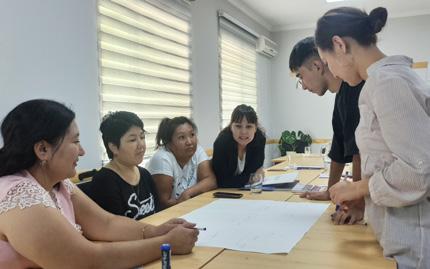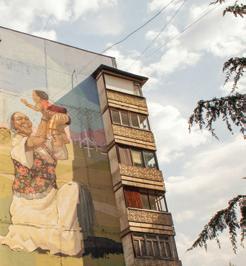
3 minute read
Partnership Development
A core aim for CAG is to always get better at what we do, including expanding our range of partners in Central Asia and identifying how to best support their work. We attempted to do it through participatory research with civil society organizations in Central Asia; to find out about the key issues that civil society in Central Asia are working with and to help finding pathways of change as it is part of our mission and to facilitate the capacity development among CAG’s network, and to find new possible solutions and pathways of change.
Advertisement

The research consisted of workshops that were carried out with 12 organizations in Kyrgyzstan, Uzbekistan and Tajikistan. The workshops were built around tools such as Theory of change, Stakeholders analysis and Problem/Solution tree, which had several benefits for the participating organizations. The outcomes of the workshop can lay a very good foundation for potential future partnerships and projects. Since the workshop, CAG has begun collaborating with several of the participating organizations. Additionally, the knowledge gained during the research enables CAG, as a non-Central Asian organization, to make sure that our work supporting CSOs in our network is done in a relevant, ethical, participatory and equal way.
Strategic Resource Fund

PATHWAYS OF CHANGE
How Partners Envision the Future
The data gathered from the aforementioned workshops was analysed and turned into the publication Pathways of Change - How Partners Envision the Future. CAG also included three climate organizations’ data in the publication. The purpose of the publication was to better understand how the organizations work with theory of change and what commonalities as well as differences there are to the way they work. Such a publication is a helpful tool for CAG, its current partners and potential future partners to map how civil society organizations in Tajikistan, Uzbekistan and Kyrgyzstan operate. The publication has been distributed across the participating organisations’ networks as well as in CAG’s network. The overall aim is to spread information and knowledge which will contribute to the strengthening of the CSO network in the region by increasing the understanding of other CSOs’ strengths and needs, which in extension encourages contact and collaboration.
For many years, CAG has been aware of the limited resources available to projects and initiatives in Central Asia; especially for grassroots organisations and individuals or groups of activists in civil society in all of the countries. Much of this is due to international development discourses, donor priorities, as well as complicated and time consuming funding processes that often includes a need for substantial contributions from the project organisations themselves.
Therefore, CAG launched the Strategic Resource Fund (SRF) in 2020; a fund that aims to easily provide resources for civil society actors in Central Asia for strategic interventions based on their own experiences, expertise and context. The fund primarily focuses on financial resources, but can also provide various forms of capacity building, international networks and partnerships, and long-term funding schemes. It is a fund with the goal to strengthen the relationship between CAG and its partners, where it enables quicker and alternative routes to partnerships as well as an exchange of knowledge and perspectives. When piloting the SRF this year, CAG developed two types of grant forms: a standard and smaller grants. The standard grant is for projects up to 7,500 USD. The smaller grant is for projects up to 2,000 USD. Going through an application process with 25 organisations and groups from various countries and locations in Central Asia, a dialogue was established with a selection of the actors, and three projects that were selected and granted funding. The organisations and their projects will be implemented in Kazakhstan, Kyrgyzstan and Uzbekistan and respectively work with climate, provide online psychological support for victims of domestic violence, as well strengthen Central Asian feminist/queer, trans- and women-led grassroots, community-based and locally organized groups and projects in the region.
The board of CAG is very excited about the opportunity to support these organisations and groups, and interested in seeing the outcome and possibilities to maintain the partnerships, learn from these processes, as well as increase the reach of the SRF – that way contributing to strengthening the civil society in the region, and establish more long-lasting and impactful partnerships.








